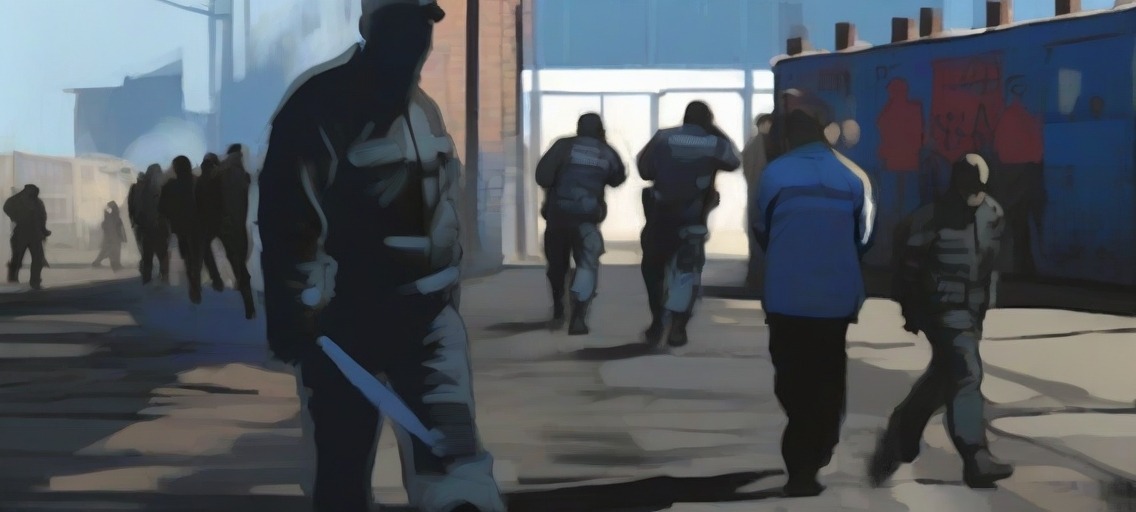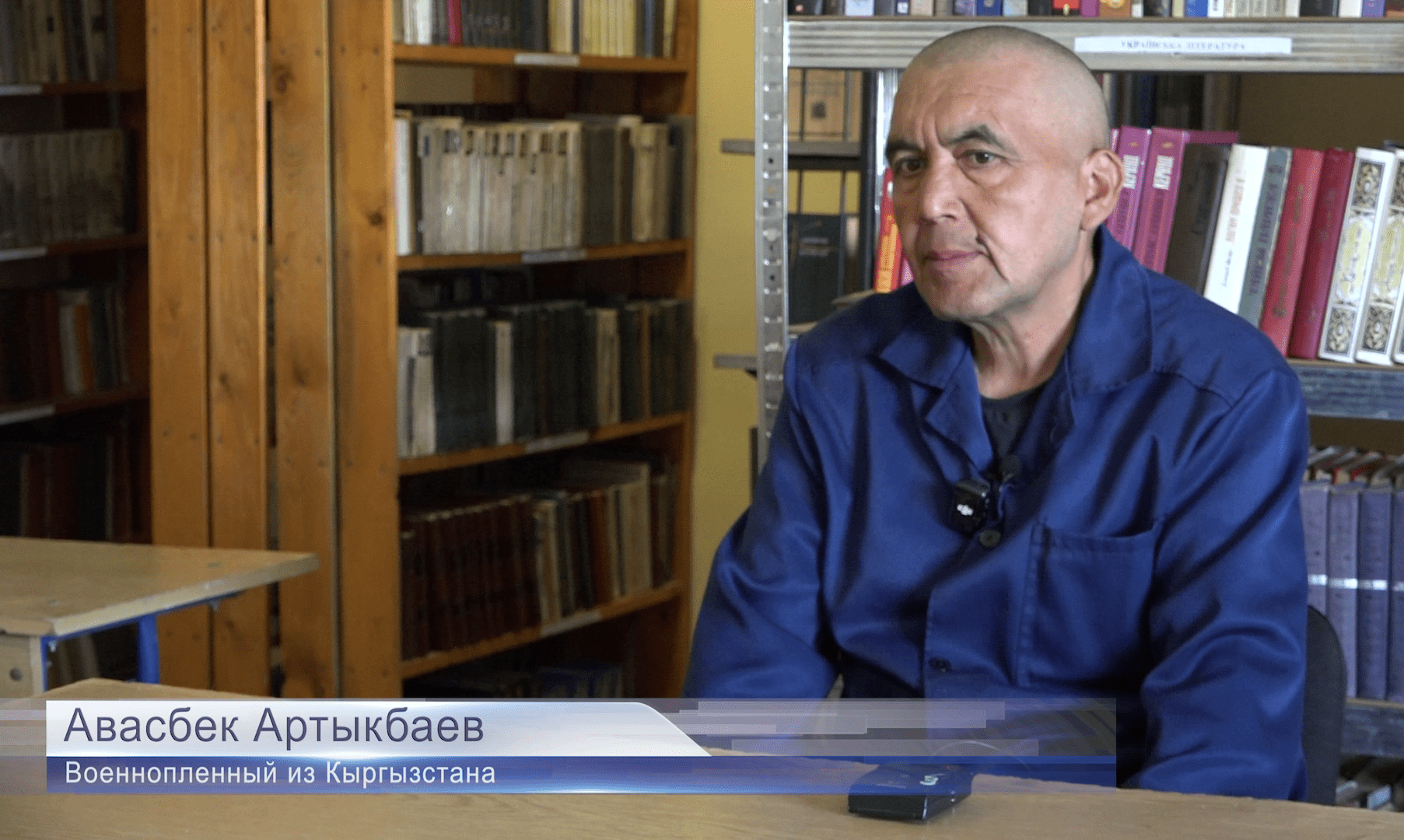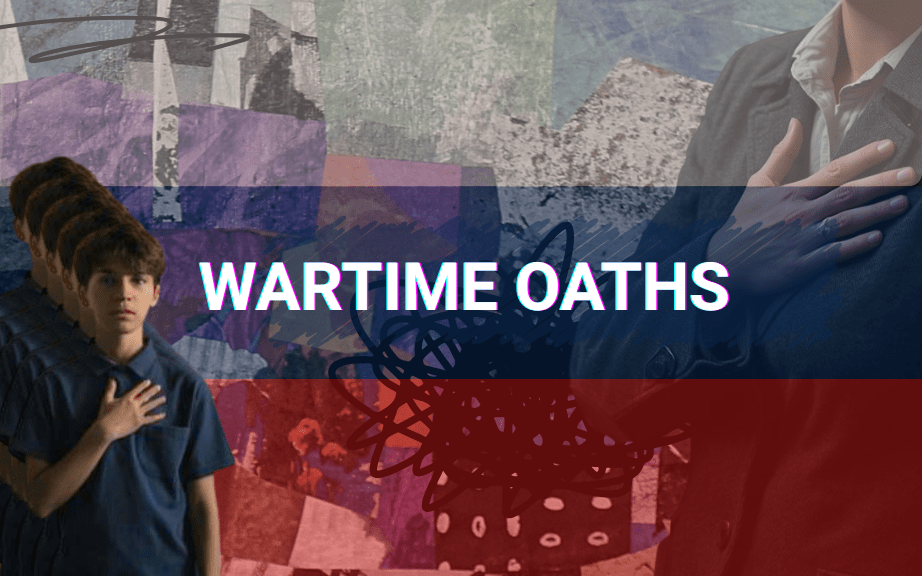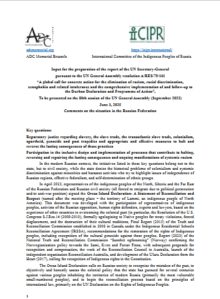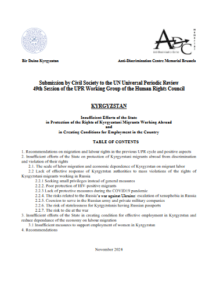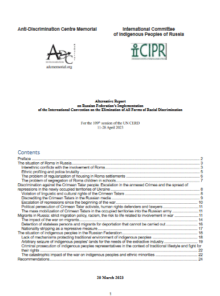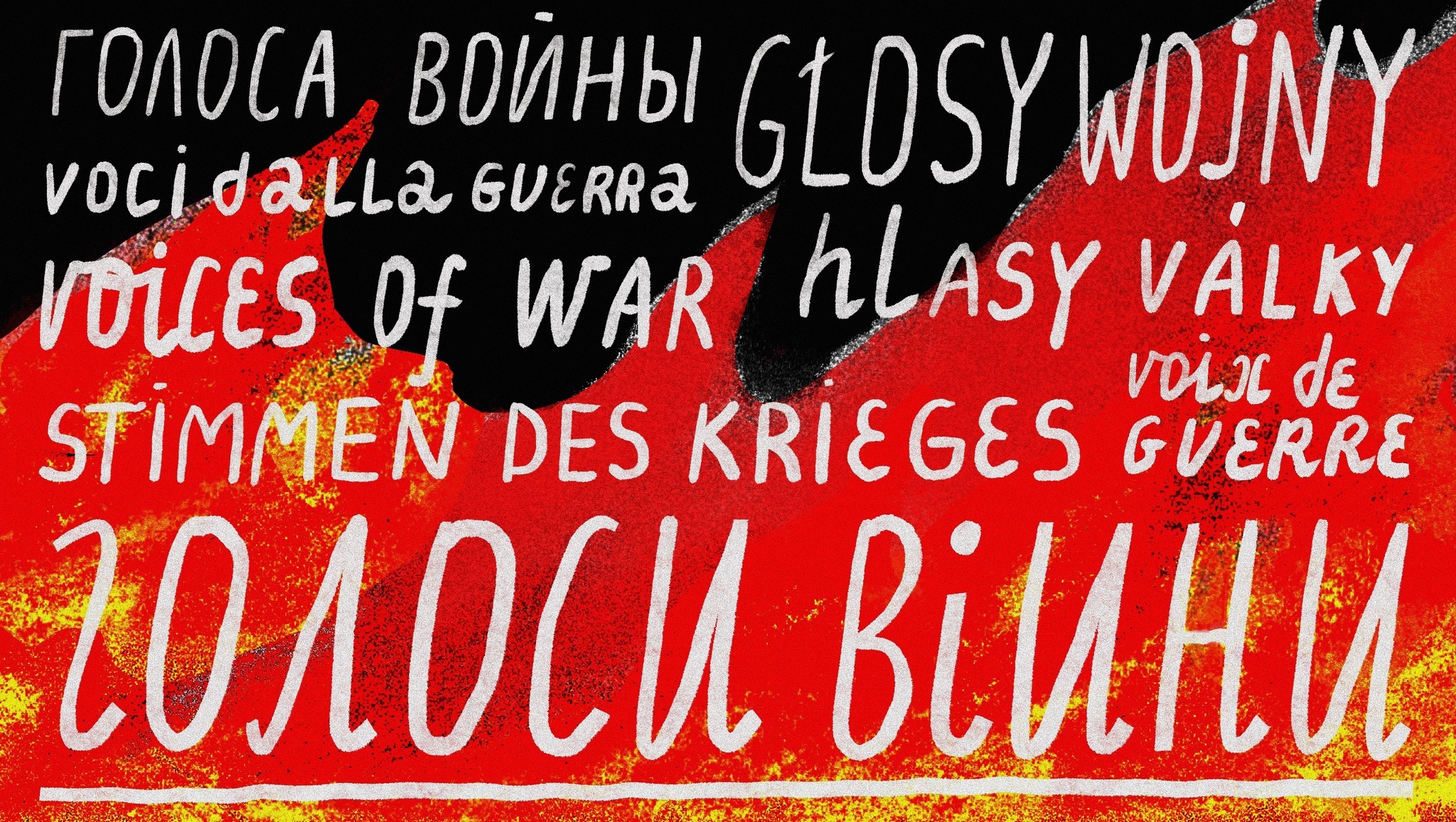In 2023, against the background of war, anti-migrant populism has firmly reemerged in Russian politics. Politicians and official figures are actively expressing anti-migrants’ views, and negative news about migrants has become a noticeable part of the media agenda. At the grassroots level, quasi-civil ultra-right organisations specialising in anti-migrant themes, such as “Russkaya Obshchina” (Russian Community) and “Severny Chelovek” (Northern Man), have gained influence. Against this backdrop, discussions and restrictions on migrant rights are being introduced. Regular and demonstratively harsh police raids are taking place, followed by forcible recruitment of foreign citizens and those who have recently acquired Russian citizenship for the war. At the same time, racist violence is escalating on the streets. However, due to military mobilisation and the state’s attempts to achieve import substitution, the demand for cheap labour of foreign workers has paradoxically increased. This creates a situation where, on one hand, the Russian state and its associated businesses actively attract labour migrants from Central Asian countries, and on the other hand, they restrict migrant rights and engage in the harassment of migrants to increase the population’s loyalty.
Context
The anti-migrant discourse emerged in Russian politics in the early 2000s, spurred by nationalist organisations such as the Movement Against Illegal Immigration (DPNI), which sought to emulate similar European movements. It remained a prominent part of the political agenda until the beginning of the first war in Ukraine in 2014. Both opposition politicians (for example, Alexey Navalny’s campaign for Moscow mayor, which actively exploited migration issues), and official political players (such as the incumbent Moscow mayor Sergey Sobyanin who organised a symbolic camp of illegal migrants on the outskirts of Moscow during the same elections) actively used this theme.
The resurgence of the migration theme in the political mainstream became evident only in 2021 against the backdrop of the elections to the State Duma. Anti-migrant narratives started regularly appearing in the media, and several high-ranking politicians made populist anti-migrant statements. With the onset of the war, the issue of migrants once again receded from the public attention. However, by the end of the year, there was a trend indicating its return to the main societal agenda.
In this context, it is symbolic that one of the first significant events of 2023 was a massive police raid on migrants in the center of St. Petersburg on New Year’s Eve. Law enforcement officers detained around 2,000 citizens from ex-USSR countries on Palace Square, loaded them onto buses, and took them for a “document check.” Out of the 1,960 individuals detained, document issues were identified in only 69 cases. The majority of the latter were fined, and four were placed in the migration detention facility. The rest of the detainees had nothing to incriminate – for them, this “preventive operation” just spoiled their New Year’s holiday.
Migrantophobia and racism
The anti-migrant discourse in Russia is marked by clear racist characteristics. The targets of these attacks are not all foreign citizens living in Russia, but specifically those who are ethnically or culturally different from Russians. Opponents of migration, in their statements, differ migrants from Central Asia and the South Caucasus from ethnic Russians from the same regions and residents of the occupied territories of Ukraine. Striking examples of such expressions can be found in the words of Kirill Kabanov, a member of the Presidential Human Rights Council.
On January 23, in his official Telegram channel, Kabanov published a call to temporarily restrict the issuance of Russian citizenship within the compatriots resettlement program. According to him, instead of “bearers of the Russian language and our culture,” the program is being used by inhabitants of some “kishlak on the Panj River with the support of their diaspora and money.” Meanwhile, “our brethren, bearers of the common language and culture, and, most outrageously, residents of new territories, often go through months, and some even multi-year bureaucratic ‘circles of hell’ to obtain the citizenship of Russia rightfully and dear to them.”
Kabanov repeatedly makes such statements and is not an exception in the Russian establishment. Similar remarks are made by both official figures and representatives of influential societal institutions. By the end of the year, amidst criticism of police raids in mosques and prayer houses by Muslim influencers, Patriarch Kirill of the Russian Orthodox Church joined the harassment against migrants. On October 25, during a meeting with students at the Moscow Pedagogical State University, he expressed concern about the long-term consequences of attracting cheap labor from abroad. In his view, such individuals “do not become close to us in terms of faith or culture.” He fears that if a different faith and culture were to “God forbid, dominate,” Russians would “lose the country.” He referred to the Russian people as the “core” of Russia.
The Patriarch continued his critique of migration from the perspective of the “state-forming people” at the World Russian People’s Council on November 28. The head of the Russian Orthodox Church stated that erroneous migration policies could lead to “the most unfortunate consequences” in Russia. He expressed concern that the influx of labor migrants, who are “neither capable nor willing to integrate” into Russian society, is altering the appearance of cities and changing the “legal, cultural, and linguistic space” of the country.
Recruitment and forced mobilisation of migrants
Despite the disdainful and hostile attitude towards migrants from Central Asia, the Russian state actively recruits them for the war in Ukraine. Reports of recruiting migrants for the “Special Military Operation” (SVO) started emerging as early as the spring of 2022. The Ministry of Defence reached out to foreigners who had recently obtained Russian passports or those planning to acquire citizenship, promising them a fast procedure. Wagner Group structures sought collaboration with foreigners serving sentences in the Russian penal system, offering them release. Information from the relatives of those convicted indicated that the promises extended beyond release and financial rewards to include torture. A wide-ranging campaign to attract migrants was unfolded in Russian cities, especially in migration facilities. For instance, a recruitment point was established in the Sakharovo migration centre (near Moscow).
Recruitment of foreigners
All these methods of recruiting migrants for the war persisted into 2023, with some undergoing additional development. In April 2023, the Ministry of Defence began involving heads of diasporas in recruitment efforts, and recruiters continued to contact migrants with contract offers. Reports indicated that detainees in deportation centers were being approached with offers to join the war, promising financial rewards and documents. This extended not only to individuals from Central Asia but also to migrants from distant countries who had unsuccessfully attempted to enter Europe through the Finnish border but were detained due to expired visas. Moreover, starting from the autumn of 2023, contract service in the army was offered to women as well, including those serving sentences in Russian prisons. Previously, only men had been recruited for such roles.
The practice of coercing foreigners into service in the Russian army has also persisted. Human rights activists and journalists have reported that individuals from Central Asian countries, including those held against their will, are being sent to war. In August, following reports from the Kaluga region about the coercion of Tajikistani citizens in detention to sign contracts with the Russian Ministry of Defense, the situation required intervention from the Ministry of Foreign Affairs of Tajikistan. After this intervention, the threats ceased.
Reports of recruiting foreigners through deception and blackmail continued. For instance, in the Kaluga region, migrants were reportedly illegally denied the acceptance of documents for obtaining Russian citizenship unless they signed a contract with the Ministry of Defence.
Military Mobilization of Migrants Who Have Obtained Russian Citizenship
However, the most significant changes occurred in the practice of military recruiting migrants with acquired Russian citizenship. If in the spring of 2022, they were merely contacted by phone, and in the autumn, attempts were made to enlist them the same way as the Russians, by the end of the summer of 2023, naturalised individuals from Central Asia became the targets of specifically organised manhunts.
On an official level, the idea of prioritising the mobilisation of naturalised individuals from Central Asia in Russia was publicly articulated in the early 2023 by the head of the Investigative Committee of Russia (SKR), Alexander Bastrykin. He stated that participation in military actions for naturalised foreigners is a constitutional duty and that consideration should be given to prioritising their deployment to the front lines. Following this, cases of travel restrictions for individuals from Tajikistan and Kyrgyzstan having Russian passports became known at the end of the month. They were informed about their inclusion into mobilisation lists, preventing them from leaving the territory of Russia for this reason.
In May, Mikhail Matveev, a State Duma deputy from the Communist Party of the Russian Federation (KPRF), announced that he was developing a draft law allowing the deployment of migrants with Russian citizenship to war. According to him, the need for drafting the bill arises from the fact that individuals with dual citizenship are not subject to conscription; they can only join the ranks of the Russian armed forces as volunteers by signing a contract. In reality, conscription of citizens with dual citizenship is possible, even if a man has completed his military service in his home country. Relevant amendments to the “On Military Duty” law were introduced as early as 2013. The only exceptions are citizens of Tajikistan; with this country Russia has signed respective agreements.
In May, Bastrykin reiterated the idea of prioritising the involvement of naturalised citizens in military service at the St. Petersburg International Legal Forum. He justified this approach by highlighting the increasing number of serious and especially serious crimes committed by “non-Russian” migrants in Russia:
“Here’s the idea expressed by people: while Russkie (‘ethnically Russians’) are on the front lines, migrants are attacking our rear. People suggest that if they are citizens of Russia, having acquired citizenship, please, go to the front. If you don’t go to the front, if you don’t fulfil your civic duty, please, go back to your homeland.”
Thus, a representative of the authorities publicly justified the call to war with a statement about migrants’ heightened propensity for crime and their hostile attitude toward members of the “state-forming people.”
In July, a similar idea was put forward by Valery Fadeev, the head of the Presidential Human Rights Council, who proposed synchronising the issuance of Russian passports to foreigners with their enlistment in military service. Fadeev lamented that upon obtaining citizenship, men often forget to register with the military enlistment office.
On the day of Fadeev’s speech in St. Petersburg, raids took place in two cities in Chuvashia, where the police targeted not only migrants but also those who had recently acquired Russian citizenship. The Chuvashia FSB reported that 10 people were brought to the military enlistment office, while the police in St. Petersburg claimed to have forcibly registered more than 100 individuals.
Subsequently, this practice spread to other cities in the Russian Federation, and raids against migrants were accompanied by representatives of military enlistment offices. Throughout August, reports of raids on migrants followed by their compulsory registration with military enlistment offices emerged from Chelyabinsk, Perm, Moscow, Nizhny Novgorod, and other cities.
Since autumn, administrative cases have been initiated against naturalized Russian citizens for failing to fulfil the duty of timely military registration, and the Investigative Committee began initiating criminal cases for evading military service. Raids continued across the country, with individuals subject to conscription and dual citizenship becoming the main target for law enforcement agencies.
The raids
Starting the year with raids on festivities during New Year’s Eve, Russian law enforcement continually expanded the list of their targets. While in the past, raids mainly took place in markets, construction sites, and dormitories, in 2023, almost any space or event where Central Asian natives were present could attract the attention of law enforcement. From mid-year onwards, representatives of military enlistment offices joined the raids, targeting individuals with acquired Russian citizenship.
The number and brutality of raids in 2023 were so egregious that they even raised questions from countries that are migration donors. Normally, authorities of these countries, economically dependent on Russia, do not criticize the actions of Russian law enforcement.
For example, in May 2023, law enforcement conducted a brutal anti-migrant raid in a university dormitory in Komsomolsk-on-Amur. According to media reports, hundreds of Tajik students were beaten during document checks. The incident was so resonant that the Prosecutor General of Tajikistan urgently sent a telegram to the Prosecutor General’s Office of the Russian Federation requesting an investigation into the actions of law enforcement and a legal assessment. The Tajikistan Ministry of Foreign Affairs invited the Russian Ambassador to clarify the situation. On June 6, the foreign ministers of Russia and Tajikistan discussed the matter during a personal meeting in Dushanbe.
However, these efforts did not reduce the scale or brutality of the raids. In August, the leadership of the Tajikistan Ministry of Labor and Migration stated that the raids were linked to the resumption of the “Illegal” operation, which had been suspended due to the pandemic. It was emphasised that all migrants, not just those from Tajikistan, were being targeted by the pressure.
According to police reports, during the operation conducted from June 19 to 25, approximately 7,000 people were deported from Russia, and criminal cases were initiated against another two thousand under various charges. In November, new data was released, with law enforcement claiming that more than 15,000 individuals were deported, and approximately 3,600 criminal cases were initiated during the operation.
A distinctive feature of the raids in 2023 was not only their demonstrative brutality but also the media coverage. Many of these operations were presented as responses to complaints from local residents.
In May, prompted by far-right organizations, the police began detaining migrants at sports facilities and football stadiums near schools. The formal pretext for these crackdowns was reports claiming that foreigners allegedly prevented local children from using sports infrastructure. Such detentions were documented in Moscow, St. Petersburg, Blagoveshchensk, Sochi, and Rostov-on-Don.
Raids in religious institutions
A significant shift in the raids on migrants to a fundamentally new level, coupled with racial profiling, was exemplified by the crackdowns in mosques and Muslim religious centers. These raids targeted individuals from Central Asia, where Islam is traditionally prevalent.
The first raid in a mosque took place on February 17 in Yekaterinburg, initially escaping widespread public attention. The situation changed after a raid on a Muslim center in Kotelniki (Moscow). While emphasizing the multi-religious character of Russian society, authorities had previously refrained from targeting Muslims as a whole, though they supported pressure on unregulated religious associations. In the summer of 2023, the situation shifted: raids now targeted centers associated with the official Spiritual Administration of Muslims, and its advocacy failed to halt these operations.
In mid-May, a group of individuals “on behalf of the remaining few Russian residents of the area” recorded a video appeal to the president, urging him to address the “mosque” in their residential building. According to their claims, the mosque attracts migrants, making the “locals” feel unsafe and unable to park their cars. The message was widely circulated on far-right social media platforms, where users were encouraged to forward it to the Investigative Committee’s office.
On May 17, investigators from the Lyubertsy Investigative Committee inspected and sealed the premises. They also conducted a raid during which “34 protocols on administrative offences committed by foreign citizens were drawn up, including the identification of 6 violators of migration legislation and 8 violators of traffic rules.” Subsequent raids took place in other locations in Kotelniki, frequented by migrants.
The Spiritual Administration of Muslims of the Moscow Region appealed to the prosecutor’s office, but it did not yield results. In July, the raids continued in other premises in Kotelniki, rented by local Muslims for prayers and religious meetings. In one of them, law enforcement officers burst in during prayers, roughly arrested the worshipers, frightened children, and even sprayed a fire extinguisher on people. According to ultranationalist organizations, which claimed credit for the police raids, more than 70 people were detained.
Muslims also decided to record a video appeal to the president, arguing that the actions of law enforcement cause “significant damage to interethnic and interreligious harmony in society.” They were supported by the head of Chechnya, Ramzan Kadyrov, who called the actions of law enforcement “unprofessional.” Protesting against police raids, a group of Muslims marched through the center of Moscow after Friday prayers. However, this action received criticism from Kadyrov and the Muslim establishment.
Nevertheless, neither the appeals to the president, nor Kadyrov’s statements, nor street actions stopped the raids in mosques. In September, the Investigative Committee launched a criminal case against one of the religious centers, and the practice of raids during Friday prayers spread to other cities. Moreover, the victims of the raids were taken to military enlistment offices, where they underwent an urgent medical examination and were handed military summons.
Raids in public and private spaces
Following the raids in football stadiums and religious centres, the manhunts began to take place in other unexpected locations. In July and September, raids occurred in several sports clubs in Moscow, where migrants often train. In October, in Khabarovsk, police checked documents during a mixed martial arts tournament called “Strelka.” Foreign citizens were taken aside for document verification, and the tournament had to be shortened due to a shortage of athletes.
In October and November, the police started conducting raids at festive gatherings. On October 31, an Azerbaijani wedding at the “Kurakina Dacha” restaurant in St. Petersburg became the target of a raid. The formal reason for the raid was the search for the scandalous blogger Tural Mamedov, who had filmed the beating of Russian teenagers. Despite Mamedov’s absence at the event, documents were checked for all 500 guests and kitchen staff. As a result, 5 people were detained for document issues. Similar checks took place in the restaurants “Bakinskiy Dvor” and “Nevskaya Zhemchuzhina” and a sports hall associated with the Azerbaijani diaspora. A similar raid occurred in Voronezh at the “Fort” restaurant in November during a birthday celebration. Law enforcement not only checked documents but also handed out about 50 military conscription notices.
At the end of November, a raid was conducted on migrant taxi drivers at Norilsk Airport. Law enforcement claimed that the reason was complaints from residents about “annoying taxi drivers.” As a result, about 40 drivers were detained, accusing them of violating military registration rules (Article 21.5 of the Code of Administrative Offenses of the Russian Federation).
The media spotlight was on the raids at the warehouses of the largest online retailer, Wildberries, which took place before “Black Friday” in December. The police were searching for migrants and those who had recently acquired Russian citizenship. According to law enforcement reports, 105 Wildberries employees with acquired citizenship were taken to military enlistment offices. Following this, a similar raid occurred at warehouses in the Tula region.
In December, a food court in the “Greenwich” shopping centre in Yekaterinburg was subjected to a raid, where the police checked documents of individuals resembling migrants. As a result, 16 people who had recently acquired Russian citizenship were detained. They were lined up, taken out of the shopping centre, and transported to the military enlistment office for registration. The pretext for the raid was a recent fight involving migrants, which ended in a shootout. In Saratov, a raid occurred in bars, cafes, and nightclubs.
Allegations of the particular criminality of migrants
The main justification for police raids and other repressive measures against migrants is the claims of their alleged increased propensity for criminal activities. Paradoxically, this is often used to explain the necessity of involving them in military service, even though participation in war implies training in weapon handling and the practical application of it.
One of the most prominent speakers on this topic in recent times has been the head of the Investigative Committee of Russia, Alexander Bastrykin. In March 2023, he stated that in 2022, compared to 2021, the number of criminal offenses involving migrants had tripled.
The reliability of these data is highly questionable. According to official data from the Prosecutor’s Office of the Russian Federation, in 2022, foreigners and stateless persons committed 40,154 crimes, compared to 36,420 the previous year. Thus, the increase was only 10% and occurred against the backdrop of an increase in the number of foreign workers entering the country after the easing of coronavirus restrictions. Moreover, according to the same data from the Prosecutor’s Office, foreign workers commit crimes less frequently than Russians. They account for only 2.04% of the 1.96 million crimes committed in Russia in a year, although various estimates suggest that the proportion of migrants in Russia ranges from 6% to 10%.
Contrary to these figures, tendentious news about crimes committed by migrants is circulated in the media. A number of media projects associated with far-right political groups, through social media, have managed to make “migrant crime” a widely discussed public topic.
This myth is not only exploited by representatives of law enforcement, who enhance their own significance by appealing to the fight against migrant crime, but also by systemic political figures of all shades. In August, Vladislav Davankov, a member of the formally “liberal” party “New People,” proposed a law that would allow the deportation of migrants for “harassing citizens.” In September, LDPR deputies and Senator Elena Afanasyeva introduced a bill requiring the expulsion of migrants from Russia for violating certain articles of the Administrative Code of the Russian Federation. In September, Mikhail Matveev, a deputy from the Communist Party of the Russian Federation (KPRF), suggested a ten-year ban on issuing weapon licenses after obtaining Russian citizenship. Later, deputies from “Spravedlivaya Rossia” party supported a similar initiative. However, all these populist initiatives faced negative feedback from the legal department of the State Duma and are unlikely to be implemented in practice.
Deprivation of citizenship
Populist proposals to revoke acquired citizenship, voiced by many politicians in 2023, did not find support in the government as well. In February, the governor of the Kaluga region called for revoking citizenship without a trial if it was obtained based on questionable documents (language proficiency). In March, the legislative assembly of the Kaluga region proposed a similar initiative against fake marriages. Both initiatives were rejected because existing law already allows for revoking citizenship in cases of providing knowingly false information. In late August, KPRF deputy Matveev introduced a bill on revoking citizenship for evading military registration or mobilization. In October, the head of the Investigative Committee, Bastrykin, proposed a similar idea. However, these proposals were also rejected.
However, the main reason for the failure of initiatives in this area was that in October of this year, a new citizenship law came into effect, which already allows for the revocation of acquired citizenship for a significant number of reasons – for committing crimes falling under the 64 articles of the Russian Criminal Code. On December 13, two men were deprived of their citizenship for crimes related to drug trafficking. On December 15, a Chelyabinsk court revoked the citizenship of two brothers aged 21 and 24 who failed to enlist in military service after receiving Russian passports. The court interpreted their evasion as the submission of “knowingly false information.” In addition to drug crimes and terrorist articles, citizenship revocation is imposed for a whole list of political offenses: calls for imposing restrictive measures against Russia, rehabilitation of Nazism, discrediting the armed forces of Russia, as well as “public calls for unleashing aggressive war.”
Labor restrictions and reducing the attractiveness of migrants for business
One of the consequences of the mass conscription, attempts to establish import substitution, and the activation of the defence industry was a shortage of labor resources. By the summer of 2023, the official unemployment rate in Russia had dropped to 3%, and experts noted a shortage of personnel, which primarily affected the manufacturing industry and agriculture. The simplest way to replenish labor resources is to attract foreign workers, as suggested by Minister of Economy Reshetnikov in September of this year. However, similar ideas and statements about a shortage of labor resources had been coming from businesses earlier, and according to demographic forecasts, attracting workers from other countries is the only way to maintain the necessary number of working-age population in the foreseeable future.
In contrast to the economic bloc, proponents of immigration control advocate for a reduction in the number of migrant workers and lobby for measures that would decrease the attractiveness of foreign labor for businesses. Most of these statements carry a populist tone and are unlikely to be implemented in reality.
In April 2023, the head of the Investigative Committee, Bastrykin, proposed introducing a “significant tax” for using migrant labor, aiming to motivate employers to hire Russians. In August, “Spravedlivaya Rossia” party advocated for a fourfold increase in the cost of a patent to reduce competition from migrants. In September, a State Duma deputy Kolunov revealed his involvement in drafting a law that would require employers to provide housing for migrants—renting apartments for them or organising special dormitories. The proposed law included substantial fines for non-compliance. In April, the Ministry of Internal Affairs suggested granting itself the authority to annul a migrant’s work permit at the employer’s request.
In June, the head of the Presidential Human Rights Council, Fadeev, called for the establishment of quotas for migrant workers for companies and industries; a similar idea was put forward by deputies of the “Spravedlivaya Rossia – For Truth” party. They submitted a bill to the State Duma prohibiting migrant labor in certain industries and setting a maximum number of migrants in various sectors. As of December 2023, none of these initiatives had been implemented.
These statements are populist and reveal the incompetence of their initiators: in Russia, a government decree has been in effect already for several years establishing the permissible share of foreign workers at the federal level, and in some industries, this share is zero. Moreover, restrictions on the employment of migrants in certain sectors of the economy have long been in place in several regions.
In the Chelyabinsk region, a ban on employment in passenger transportation for foreign workers with patents was introduced as early as 2015. However, citizens of Euro-Asian Economic Union member states — Kazakhstan, Kyrgyzstan, Belarus, and Armenia — are not subject to this restriction. In the Tyumen region, a similar ban was adopted in 2019. In the Kaliningrad region, since 2021, there has been a ban on foreign labor in the production of bread, confectionery, and baby food, in passenger transportation by buses and taxis, in short-term rental housing, in the field of preschool and school education. Starting from 2024, this list will also include work in the field of data processing and information services. Similar restrictions, as well as the suspension of naturalisation of foreigners under the “resettlement of compatriots” program, have been introduced in the Kaluga region since 2022. In 2023, these regions were joined by the Tula region, where migrants were prohibited from working in catering, public transport, as well as trading in alcohol and tobacco, and the Magadan region, where the ban was limited to passenger transportation.









 Feedback
Feedback 